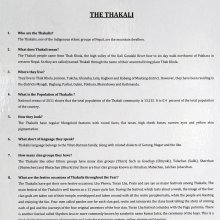Thak, Ṭhak: 2 definitions
Introduction:
Thak means something in Hinduism, Sanskrit, Hindi. If you want to know the exact meaning, history, etymology or English translation of this term then check out the descriptions on this page. Add your comment or reference to a book if you want to contribute to this summary article.
Images (photo gallery)
In Hinduism
Vyakarana (Sanskrit grammar)
Source: Wikisource: A dictionary of Sanskrit grammarṬhak (ठक्).—A very common tad. affix इक (ika), or क (ka) in case it is added to words ending in इस्, उस्, उ, ऋ, ल् (is, us, u, ṛ, l) and त् (t) according to P. VII. 3. 51, causing the substitution of vrddhi for the first vowel of the word to which it is added. ठक् (ṭhak) is added to (1) रेवती (revatī) and other words in the sense of descendant (अपत्य (apatya)) e. g. रैवतिकःः, दाण्डग्राहिकः, गार्गिकः, भागवित्तिकः यामुन्दायनिकः (raivatikaḥḥ, dāṇḍagrāhikaḥ, gārgikaḥ, bhāgavittikaḥ yāmundāyanikaḥ), cf. P. IV. 1.146-149; (2) to the words लाक्षा,रोचना (lākṣā, rocanā) etc. in the sense of 'dyed in', e. g. लाक्षिकम्, रौचनिकम् (lākṣikam, raucanikam) ; cf. P. IV. 2.2; (3) to the words दधि (dadhi) and उदश्वित् (udaśvit) in the sense of संस्कृत (saṃskṛta) 'made better ', e. g. दाधिकम्, औदश्वित्कम् (dādhikam, audaśvitkam) (क (ka) instead of इक (ika) substituted for टक् (ṭak)), cf. P. IV.2. 18, 19; (4) to the words आग्रहायुणी, अश्वत्थ (āgrahāyuṇī, aśvattha) etc.; cf. P. IV. 2. 22, 23; (5) to words expressive of inanimate objects, to the words हस्ति (hasti) and धेनु (dhenu), as also to the words केश (keśa) and अश्व (aśva) in the sense of 'multitude '; cf. P. IV. 2. 47, 48; (6) to the words क्रतु, उक्थ (kratu, uktha) and words ending in सूत्र, वसन्त (sūtra, vasanta) etc., in the sense of 'students of' (तदधीते तद्वेद (tadadhīte tadveda)), cf. P. IV. 2.59, 60, 63; (7) to the words कुमुद (kumuda) and others as also to शर्करा (śarkarā) as a चातुरर्थिक (cāturarthika) affix; cf. P. IV. 2.80, 84; (8) to the words कन्था, भवत् (kanthā, bhavat) and वर्षा (varṣā) in the Saisika senses; cf. P. IV. 2.102, 115, IV. 3.18; (9) to the words उपजानु (upajānu) and others in the sense 'generally present '; cf. P. IV. 3. 40; (10) to the words consisting of two syllables, and the words ऋक्, ब्राह्मण (ṛk, brāhmaṇa) etc.in the sense of 'explanatory literary work'; cf. P. IV.3.72: (11) to words meaning 'sources of income ' in the sense of 'accruing from’; cf. P. IV. 3.75; (12) to words denoting inanimate things excepting words showing time or place in the sense of ' भक्ति (bhakti) ', cf P. IV. 8.96; and (13) to the words हल् (hal) and सीर (sīra) in the sense of 'belonging to', cf. P. IV. 3.124. The tad. affix ठक् (ṭhak) is added as a general termination, excepting in such cases where other affixes are prescribed, in specified senses like 'तेन दीव्यति (tena dīvyati), ' 'तेन खनति (tena khanati),' 'तेन संस्कृतम् (tena saṃskṛtam)' etc.; cf P. IV. 4.1-75, as also to words हल, सीर, कथा, विकथा, वितण्डा (hala, sīra, kathā, vikathā, vitaṇḍā) etc. in specified senses, cf. P. IV.4. 81, 102 ठक् (ṭhak) is also added as a general tad. affix or अधिकारविहितप्रत्यय (adhikāravihitapratyaya), in various specified senses, as prescribed by P. V.1.19-63,and to the words उदर, अयःशूल,दण्ड, अजिन, अङ्गुली, मण्डल (udara, ayaḥśūla, daṇḍa, ajina, aṅgulī, maṇḍala), etc. and to the word एकशाला (ekaśālā), in the prescribed senses; cf. P. V. 2.67,76, V. 3.108,109; while, without making any change in sense it is added to अनुगादिन्, विनय, समय, उपाय (anugādin, vinaya, samaya, upāya) (औपयिक (aupayika) being the word formed), अकस्मात्, कथंचित् (akasmāt, kathaṃcit); (cf.आकस्मिक काथंचित्क (ākasmika kāthaṃcitka)), समूह,विशेष, अत्यय (samūha, viśeṣa, atyaya) and others, and to the word वाक् (vāk) in the sense of 'expressed'; cf. P. V. 4.13, 34, 35. The fem. affix ङीप् (ṅīp) (ई) is added to words ending in the affix टक् (ṭak) to form fem. bases.

Vyakarana (व्याकरण, vyākaraṇa) refers to Sanskrit grammar and represents one of the six additional sciences (vedanga) to be studied along with the Vedas. Vyakarana concerns itself with the rules of Sanskrit grammar and linguistic analysis in order to establish the correct context of words and sentences.
Languages of India and abroad
Hindi dictionary
Source: DDSA: A practical Hindi-English dictionary1) Thak in Hindi refers in English to:—(nf) a rap; (a) aghast, baffled; ~[thaka] rap, tap; knock; —[ho jana] to be aghast/stunned/baffled..—thak (ठक) is alternatively transliterated as Ṭhaka.
2) Thak in Hindi refers in English to:—(nf) stick(ing)..—thak (थाक) is alternatively transliterated as Thāka.
...
See also (Relevant definitions)
Starts with (+261): Taka, Takacanti, Takacildar, Takacu, Takai-umilaippum, Takaippu, Takaivilankuruvi, Takaiyanankuruttal, Takalon, Takalpacci, Takalpaci, Takalupaci, Takaluppu, Takamai, Takamatakki, Takametuttal, Takan, Takana-palipitam, Takanai, Takanakaram.
Ends with (+11): Anekarthak, Aprithak, Baithak, Bara gwathak, Belaiti-baithak, Bibithak, Buzi izbuthak, Chota gwathak, Ekarthak, Gwathak, Hariltthak, Izboothak, Kathak, Katthak, Koshthak, Lanthak, Latthak, Migong thak, Migong-thak, Nauthak.
Full-text (+571): Andhasika, Ambhasika, Karunika, Kausritika, Vastavika, Udvahika, Abhyasika, Caturika, Daivika, Dambhika, Kathika, Prithan, Antarvamshika, Candanika, Migong thak, Thaketi, Thak-thing suak, Prithag, Ativahika, Vaishayika.
Relevant text
Search found 8 books and stories containing Thak, Ṭhak; (plurals include: Thaks, Ṭhaks). You can also click to the full overview containing English textual excerpts. Below are direct links for the most relevant articles:
Vasudevavijaya of Vasudeva (Study) (by Sajitha. A)
Taddhita (in Sanskrit grammar) < [Chapter 3 - Vāsudevavijaya—A Grammatical Study]
Uṇādi-sūtras (Grammar rules) < [Chapter 3 - Vāsudevavijaya—A Grammatical Study]
Sahitya-kaumudi by Baladeva Vidyabhushana (by Gaurapada Dāsa)
Text 7.112 < [Chapter 7 - Literary Faults]
Vakyapadiya of Bhartrihari (by K. A. Subramania Iyer)
Verse 3.10.6-7 < [Book 3 - Pada-kāṇḍa (10): Puruṣa-samuddeśa (On Person)]
The Agni Purana (by N. Gangadharan)
Manusmriti with the Commentary of Medhatithi (by Ganganatha Jha)
Verse 8.241 < [Section XXXIX - Disputes between Owner and Keeper]
Mimamsa interpretation of Vedic Injunctions (Vidhi) (by Shreebas Debnath)
